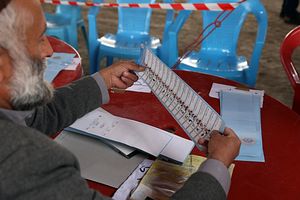The preliminary results of the Afghan presidential election are out. According to the data released by Afghanistan’s Election Commission (EC), President Ashraf Ghani has won a slight majority and thus a second term in office.
While it’s encouraging that the presidential election is entering its final phase following months of controversy, the results are suggestive of an ominous outcome in many ways. Afghanistan appears more internally divided than ever, with groups like the Taliban and regional states positioning to take advantage of the ongoing fragmentation to extract maximum benefits.
A map published by the EC shows a treacherous division between the north and south. Ghani is leading or winning in the 16 south and eastern provinces while rival candidate Abdullah Abdullah received the highest number of votes in 18 provinces in the north and central highlands of Afghanistan. This division is not only reflective of a deep ethnic divide in the country, but also suggests that another feud between the leaderships of two sides and their position on key issues is in the offing.
To start, there appears no likelihood of compromise between Ghani and Abdullah as the former has completely endorsed the results and the latter has rejected the outcome and considers it fraudulent and bogus. Several other candidates have raised concerns about the irregularities in the voting system and expect the EC to discard thousands of votes.
Even if EC discards thousands of votes and the process goes into a second round runoff, the results are going to be as divisive as they are now. Moreover, there appears to be no desire for another round of election between Ghani and his rival Abdullah. With such glaring divisions, any government formed in result would remain weak; accommodate tribes, warlords, political and ethnic interest groups; and ignore enduring malpractices in Afghanistan’s bureaucracy. Undoubtedly, without a leader who is endorsed by all sides, the country could crack further along ethnic and tribal lines.
As of now, there appears to be no chance of forming a cross-party government of national unity. Ghani and Abdullah, having already experienced one term of a “unity government,” are wary of an outcome where one group sits at the helm of affairs, amasses political fortunes, and the other has to govern in the shadows. However, going forward, any such outcome cannot be avoided if various interest groups outside Afghanistan tried to undermine the entire electoral process.
Consider this: Washington’s entire focus remains on making a deal with the Afghan Taliban. States like China, Pakistan, and Iran are also interested in seeing a peace deal done. However, thus far, the Afghan government sits on the sidelines and the northerners believe that the Taliban is an “obstacle” to the peace process.
It is expected that Washington is not going to endorse any single party as the winner and may use the election as a bargaining chip with the Taliban. “Recognizing that a majority of Afghans were not able to vote, the eventual winner, whomever that is, must take early and concrete steps to ensure the country’s rich diversity is well reflected in its leadership and its negotiating team,” said Alice Wells. The U.S. ambassador to Afghanistan, John Bass, in a Twitter post said that “It is important for Afghans to remember: these results are preliminary. Many steps remain before final election results are certified, to ensure the Afghan people have confidence in the results.”
These statements have further put to question the credibility of the announced outcome and the entire exercise. However, for the United States, the election results have come at a critical time as Washington works toward making a deal with the Taliban. Last week, Tolo News revealed that a group of senior Taliban leaders met with their elders in Pakistan and got a go-ahead for “a short-term ceasefire after an agreement is signed between the U.S. and Taliban.”
Arguably, one of the few concessions that the United States could make to the Taliban is scrapping the current electoral process as the militant group is not expected to accept an outcome where it has no presence or says, constitutionally or otherwise. In a case where the United States uses the election as a bargaining chip with the Taliban, the prospect of a political accord between Abdullah and Ghani cannot be ignored.
The controversy surrounding Afghanistan’s election results is likely to take a few more months as complaints and counter-complains pileup. However, it’s unclear if international stakeholders, particularly the United States, have time for that.
































